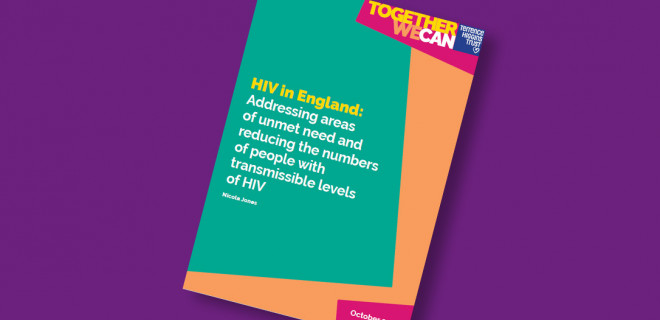Finally it's out! The State of the Nation - Sexually Transmitted Infections in England comprehensively describes the current situation in the fight for better sexual health, really hitting home what needs to change.
The report is inclusive of the needs of trans people, stating there are no known STI data on trans, non-binary and gender diverse populations in the UK. We've been campaigning for eight years at CliniQ for sexual health equality and inclusion in sexual health and HIV, yet still we had no data. Without relevant statistics, the trans community is invisible and isn't getting the necessary funding to address inequalities in health provision.
Globally, transgender people face higher rates of HIV, with risk of transmission up to 12 times greater than the general population. We don't know about STI rates in trans, non-binary and gender diverse people in England. The binary data system excludes anyone who is not cis gender, so the data is not available.
Trans and non-binary people are not hard to reach - at CliniQ we know how to reach our communities.
Other minorities are being excluded too. The report makes clear that there is 'a lack of evidence on specific ethnic minority communities - with too much data using the unhelpful "BAME" and "other" grouping'.
The public health sector should be working with trans organisations and communities to co-produce research and data on the sexual health of trans and non-binary and gender-diverse people. While some partnership working has taken place, the report affirms that this has not been enough.
The report says: 'It is a scandal that there hasn't been access to this data but a welcome step is Public Health England's commitment to begin to collect data as part of national STI surveillance. It is important that this data collection is accurate and inclusive following the same format as the HIV data collection that CliniQ helped to write.'
Highlighting one change in those eight years of CliniQ campaigning, there is now data on HIV and trans, non binary and gender diverse populations in England. We've finally agreed a way forward, working with Public Health England, LGBT Foundation and other trans people. The two-stage data system we use at CliniQ has been adopted nationally. At CliniQ we will build on this data.
So, for the first time in UK we know that 0.62% (609/94,885) of people accessing HIV care between 2015 and 2017 were potentially trans. From this, 178 were confirmed as trans (0.19% of people in care):
- 79% (140) identified as women.
- 7% (12) identified as men.
- 11% (20) identified as non-binary
- 3% (6) identified in another way non-binary.
This shows that by working with communities we can make the same changes in reporting STIs, which the State of the Nation report is focusing on. We can blame the out-of-date data system, binary intake forms and pro-formas for the lack of evidence in STIs in sexual health services, but the underlying cause is the systemic exclusion of trans, non binary and gender diverse people from all aspects of health.
Michelle Ross is Founder and Director at CliniQ.



